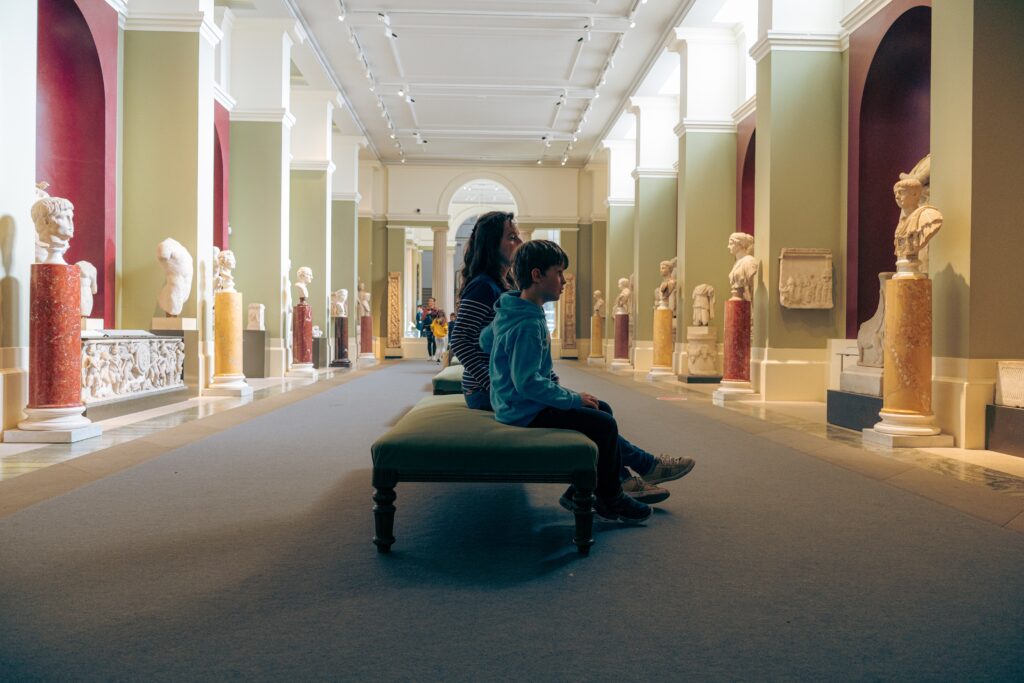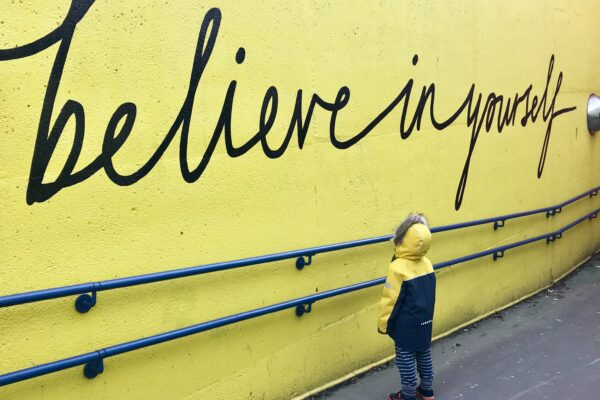Prefer audio over reading? Check out the full podcast episode here.
John Strelecky:
Hello everyone and welcome to The John Strelecky Audio Experience in this episode with Nathan Hurd from the Rich Life Lab. We talk about why I wear my hat everywhere, trusting the internal compass inside you, how generational trauma can play out in the long term and taking a step into the unknown, even if it seems crazy. Enjoy!
Nathan Hurd:
I’ve seen you give so many interviews and you’re always wearing that same hat and, I might be mistaken, but I think that’s a Tilley hat.
Could you tell us the story of where you got the hat? where’d it come from, and why do you wear it?
John Strelecky:
Yeah. First of all, it is a Tilley and I don’t get paid by Tilley to talk about it, but I do talk about it. And this is a really good example of why when you do something well, that the world responds positively to it.
So I had backpack around the world in my early thirties. That was one of the most major life-changing things that I did. During that trip, I had bought a hat on the streets of Beijing for about $2 and promptly went on to destroy it over the course of my travel. So I come back home, I needed a hat & walked into this outdoor outfitter store. They specialize in kayaks and, you know, really good high-end gear. And, and I said to the guy, I need a new hat. He said, Have you ever tried Tilley?
Never even heard of Tilley. He said here, try this on. So he had me try it on, it’s super lightweight, and I look in the inside of it and there’s something inside that says, this floats, ties on, repels rain, blocks UV rays, has a lifetime warranty, and comes with a four page owner’s manual.
I think it even says they’re a hundred percent guaranteed for life. So I said, well, it fits really good, how much is it? He said, it’s, $75. Now again, I bought my last one for two bucks in the streets of Beijing. And I was like, $75 bucks for a hat. He said listen, you try this hat, and if you are in any way dissatisfied, you bring it back at any time. I will buy it back from you. I said, all right. So I bought the hat.
Nate. I have taken this hat to the depths of the Amazon jungle where it rains, like I live in Florida, where you think it rains heavy. The Amazon, is just like you can’t even see when it’s coming down. And this thing is like wearing an umbrella.
I’ve smashed this into my backpack and taken it to Albania, Macedonia, all these crazy places. This is truly the most amazing hat ever. And the best thing, and this is like such a great customer service story. So after about four years after I bought the first one, a little rip started to develop on the top.
And so I called the customer service line. I said, listen, I hate to even ask this because I have totally gotten my money’s worth out of this hat but there’s a little rip on the top. And she said, sir, say no more. What size is it? And I said, how would I know that? She said, well, look inside on the tags. I said, ma’am, the tags are worn out. Like I, I can’t even see what they say anymore. And she said, don’t worry about it, send it back to us, but please send it back priority mail. So, all right. I go, I ship it back priority mail. It was like nine bucks back then to ship it priority mail. Seven days after they receive it, I get a box in the mail.
It is a brand new hat, Perfect size for my head, the exact right type of hat. And I get a check for $9. I am a fan for LIFE. I’ve been a customer life now. It’s an amazing hat. The service is amazing.
It’s like a great example of when you do something that you love and you do it really, really well, the world will be your best marketing tool ever!
And people are always like, well wait, if they keep replacing your hat, how is it any good? Nate, I’ve probably bought 50 of these things for other people, for myself. Like when I go on media tour, I carry one that I wear when I’m just goofing off. I carry two that I wear on stages in case something happen to the first one, I’m a fan for life.
Nathan Hurd:
Wow. What a great story. You know, in business it’s amazing how far excellent customer service and devotion to the experience your customers have will go. I mean this is a great example of a company that gives you a hat that’s warrantied for life and creates such a raving fan kind of customer base that the word of mouth carries it farther than it probably could on its own or with all sorts of paid marketing.
John Strelecky:
Yeah. And to your question of why do I wear it in interviews? Why do I wear it in podcasts like this? To me, life is a great big adventure. And I feel more like I’m in the midst of the adventure when I’m wearing it. If you and I hang out together and we go kayaking on a river down here, you’re gonna see me in it.
If I’m out on the golf course, you’d see me, and if I’m out fishing, you’d see me in it. So it’s just something that I have pretty much on my head almost all the time when I’m in the midst of an adventure.
Nathan Hurd:
Nice. Well, it fits your personality and, what I understand about your interest extremely well.
So thanks for sharing that. Let me ask you, I know that as an author who’s been writing books for quite a long time, you get letters and feedback, and I know one of the great parts about, putting work like this out there, at least in my experience, has been the feedback that you can get from the people who are impacted by your work.
Can you share with us at the top here, do you have an example of a letter that you’ve received that was especially impactful to you, that really brought full circle all the work that you’ve put out into the world?
John Strelecky:
Yeah. Two things immediately come to mind. So one is an in-person experience I had with a gentleman.And the other is the letter that you just referenced.
So I’ll tell the letter first and then I’ll, talk about the other one. Just very recently, we actually received this amazingly beautiful letter from a young 20 year old kid. She commented that she had gone off to university during the midst of the pandemic.
She was so alone, she missed everything about her friends, her family. She was isolated and she just really lost her way. And she said she had never felt a depression, like she had felt during that experience. And so she decided to go back home to see her family. And while she was there, she discovered The Cafe on the Edge of the World in the library says she literally put on a blindfold, was like, I’m gonna pick a book and read it.
And she picked The Cafe on the Edge of the World and read it. She wrote about what it meant to her and how from like the very first couple of pages, she started to feel lighter and there was a brightness about her. And she went on to talk about it and what it meant to her. It was a really beautiful letter.
And at the end she said, I just wanted to let you know that your book kind of saved me. She just, you know wanted to say thank you for that. And, and I’m able to have this conversation now because of that.
I’ve been there, I’ve been in those positions where you feel very alone. You feel like you’re trying to figure out life. You don’t have the answers. It’s sort of collapsing around you.
That is sort of the history of The Cafe on the Edge of the World. It’s amazing how many people tell me it fell off the shelf in front of me, or my friend recommended it to me at just the right time. Books have an energy. If there’s a book in your list, and I’d love to hear what that is for you, Nate, a book that has changed your life. My guess is that it found you at just the right time.
I can’t explain how it happens, but books have an energy of their own and yeah, these are the type of things that inspire me to no end. The other one that I was talking about; I was up in Quebec, Montreal area, doing a book signing.
A guy waited for a long, long time, cause it was a very large crowd. And at the very end he came up and had tears in his eyes right in front of me. And he said, I want you to know that I’m, I’m here today because of this book. And he slid The Big Five for Life across the table. And he said, uh, I was gonna, I was gonna take my own life.
He said My business was doing really bad and something happened and my business partner cheated and took all the money. And, and I looked at my family and I thought, how can I be such a disappointment to them? And he said, I was going to take my life. And he said, my friend saw how low I was and they gave me this book.
And he said, I’m here today and I’m the father that I am today because I read that story. And you know, there’s just nothing like that as an author of inspirational books to, to hear that that’s the kind of impact that a book can have. So, yeah. Good stuff.

Nathan Hurd:
It’s really good stuff. That’s, that’s incredible. It’s, amazing how deeply books can impact you if they’re written at the right moment for someone in the right way, or if they land in someone’s lap as you described. I’ll tell you just one book that impacted me recently, which is a book that was written back in 1989. But right now, for whatever reason, and I think you’re describing this, which is that I think everyone feels alone or more alone or has been more likely to feel that way in the recent year or two.
And I’ve certainly had my own version of that experience as well. It’s, it’s not easy. And right now, here in Maryland it’s cold, it’s snowy, it gets dark early, and so, um, I’ve picked up a book called The Seat of the Soul, which is recommended to me by a good friend and. It has a lot to do with Inner Journey and, being aware of your own emotions and the differences between decision making that’s rooted in fear or rooted in love.
Yeah. And you know, for me that’s been, it’s been a really, a beautiful book and it’s been really good timing. So, I really appreciate you sharing that.
John Strelecky:
I think there’s a really interesting point there, which is, that’s an intuitive call. When your friend says to you, I think this is a great book for you, that’s them using their own deep intuition because they probably have a library in their head of a thousand books or more that they’ve read and they could recommend anything.
But in that moment, they’re trusting their intuition. And you, once it’s been referred to you, you’re trusting your intuition either to read it the first time or as you said in this in to go back to it. Uh, and that is, I think that’s a hugely overlooked aspect of life. This trusting that inner guidance system that we have within us.
And that applies to whether it’s which book to read, which job to take, the way to parent if you have a particular calling to be a parent. If I was to recommend anything out of probably all the things that people ask me during your travels, life, the rest of it, what’s one of the most underused gifts that we have in front of us?
It’s trusting that inner guidance system.
Nathan Hurd:
Yeah. That’s incredible. And I think, it’s a skill that takes, you know, cultivation
John Strelecky:
Absolutely, It’s like a muscle I find. If you’ve ever had the experience where you’re about to head out and you’re like, I’m forgetting something.
Have you ever had that? Like, you just know there’s something there, but you don’t know what is there, but you’re forgetting something. And then sure enough, you get in the car, you drive, you’re, three miles down the road and then it hits you. The thing you were supposed to bring with you, that package you were gonna drop off or whatever is the thing.
But I find that if you got to build that muscle, So in that moment you realize three miles down the road, oh, that’s right. My intuition was telling me something. Uh, the next time you are thinking about it, and if you stop and pause for just a couple of seconds, You can’t quite figure it out and then you get in the car and you’re just about to back down the driveway and then you’re like, oh, that’s right. That package that I’m supposed to bring to somebody. The more you sort of tap into that, then eventually you realize it before you even leave the house. And then you can get to the point where as you’re thinking about your day, and your intuition says to don’t forget the package. It’s sort of like learning a language. Are you able to process the call before you need it? I use it in sports all the time. I’m, a very active athlete still to this day. I used to be a professional beach volleyball player and it’s amazing the more, as an adult, because I don’t have the physical skills anymore that I used to have when I was in my twenties.
But I can tap into these intuitive elements and I can see stuff before it’s going to happen. It’s an amazing gift to use in all aspects of life.
Nathan Hurd:
So do you find that you at this point are you able to almost automatically trust your intuition without questioning it?
John Strelecky:
A hundred percent. So much so that there are times when I really, really want to override it, cuz logically it doesn’t make any sense what the call is.
I’ve done that before, it’s funny cuz I don’t know why, but one of the places that this really used to hit me, I used to be a golfer as well, I don’t golf anymore, but I used to be a golfer and I’d be looking at the shot, Nate. I would say to myself, that’s a nine iron all day long. And my intuition would be like, that’s an eight.
And I’d be like, that’s a nine. I’m like, 135 yards away. I know that’s a nine. And I would feel that to Nate and I hit the shot. And of course the club that I should have used was the one that my intuition was telling me to use. This happened so frequently that I stopped overriding it and it was amazing how successful that was.
So that’s like a very specific kind of like non-important example, but then when I started to do it in everyday life, whether it would be a business decision that I had done all the research, I had looked at all the analytics and I knew that the answer was yes, but my intuition was telling me it’s not quite what you think it is.
And I’d go back and I’d look again, or I’d give it another day to think about it and I’d find the thing that my intuition was talking to you about. So yeah, I listen now with a hundred percent. If I’m getting that call, I don’t need to understand why I’m getting the call. It’s worth listening to.
Nathan Hurd:
That sounds really interesting. Yeah. It’s especially true now with so much distraction. That inner voice can be dimmed down by all the totality of life. And it’s amazing how on point our inner voice, our bodies and are minds can be. They know what we need.
John Strelecky:
Yeah, and there’s been tons of fascinating studies about this one. I can’t remember the exact details of this one, but I’ll give you the essence of it. And it was a computer simulation where you would look at cards coming up. And the, the goal was to beat the dealer. And so they would flip up a, a king, and you would have to guess whether you thought your card was going to be higher or lower, but there was something in the system where eventually you could figure out what the pattern was and you could figure it out the answer.
And so they put sensors on people that would measure their heart rate, that would measure different biometrics to determine whether they sort of had figured it out or not. And then they would let the person play the game and play the game. I think it was like after about the 300th turn of the cards, the person could explain why they knew the answer and how they had figured it out.
They were actually winning at about the 200 marks. So even though they couldn’t quite explain what they had figured out. Their intuition, which was reflected in the biomarkers, had figured it out at the 60th card. And you’re like, well, I can’t even explain how that happens, but the point is that. it’s there. And the more you use that in life, just the easier life gets.
Nathan Hurd:
Wow. All right. I’ll try to find that study and maybe we’ll link it, to this video and audio. I think one of the things I admire so much about you is that you have cultivated this sense of trust, in yourself.
And I know you’ve been through, you’ve had many experiences throughout your life that have led you to be more trusting and a lot of these decisions were big decisions where you made some really bold choices. So if we could maybe talk just a little bit about how this all came to be.
So, I understand you grew up in Illinois. Can you tell us a little bit about your youth and how that led you to your kind of your first professional aspiration?
John Strelecky:
I grew up outside of the Chicago area, so I can appreciate your Maryland comment about the cold, because that is exactly why I fled. I was an athlete growing up as a kid. I was a good student. I didn’t have a ton of self-confidence. I was a good athlete, but I could have been a great athlete had I have had the self-confidence.I sort of went through the experience of school. I didn’t really understand school.
I felt like I could miss half the days and understand just as much. And so I was one of those kids that was probably a teacher’s worst nightmare. Well, why do we need to know this? How is this relevant to the rest of my life? And they hated that type of question, but I just didn’t get it. I didn’t see where the train was heading. And as part of that, I didn’t see where my life was heading either. I wasn’t one of those kids that knew I want to be a, you know, some kids know I want to be a doctor, I wanna be a veterinarian. I want to be a driver of a train, whatever. I didn’t have that tremendous awareness.
So I got to my senior year in high school and they said, so where are you going? This is the time you have to make a decision. I didn’t know what I wanted to be and I saw the movie Top Gun, if you remember that from way back then. And I was like, okay, that looks pretty freaking awesome to be competing against the best of the best. I loved that idea to be pushing yourself to be the best of the best, and I wanted to be an adventure. I was an adventure in my core and I wanted to be an adventure. And I was like, okay, this flying thing sounds really good. The little bit I knew about flying was if you eventually become an airline pilot, you get free airline tickets to go see the world. And if you structure your schedule the right way, you can work three days on, four days off and then four days off, three days on again, which meant you just had eight days off. And I knew of no other career that you could do something like that and you made good money. So it seemed like a good call.
I didn’t know anything else that sounded more appealing and so I decided that was gonna be my path. And so, crazily enough in terms of the, the configuration of the universe conspiring to assist. Like two weeks later, someone was coming to my little high school in the, the suburbs of Illinois. Talking about a school called Embry Riddle in Daytona Beach, Florida. Emery Riddle is one of the top aviation universities in the world. I was like, what are the odds? Like I just have this thought that that’s what I wanna do. This person is coming. I talked to this lady, she was awesome. She’s like, yeah, have you ever been to Florida?
I was like, oh my God. Yeah. My family takes one vacation a year. We flee the cold in February. My parents take us outta school. We go to Florida. She’s like, well, this is where you’ll be in school, Florida. And I was like, okay, this sounds like Nirvana. And so I did. I went down there. I had a fantastic career down there.
I worked my ass off, cause I didn’t have much money as a kid. I was working jobs while I was going to school. The deal at my university was if you took more than five classes, some more than 15 credit hours, everything above that was free. And so I literally would take 21 credit hours, which is almost a two times full-time student.
Cause 12 credit hours is full-time. I was taking 21 credit hours. I literally had a perpetual nightmare. I’d walk into a final and have no idea what was on the test because I hadn’t been to class. I did it cause I didn’t have money. And so I worked through it all. Ended up getting this amazing internship with United Airlines.
Nate, I was poised to be driving a Corvette with the top down, a pilot for an airline. I get my shot and I find out that I have a heart condition nobody’s ever diagnosed before. Wouldn’t be diagnosed until I was 32 because they don’t give you this particular test as a pilot until you’re 32. And in one day I go from thinking I am on top of the world to I am under the bottom of the bus. I have no clue what the heck I’m doing and I’m being run over by the bus.

Nathan Hurd:
Wow. I have a follow up question on that, and you made me think of something else that I’d love to hear your thoughts on. In my experience, it’s easier for me to connect the dots when I look backwards in my life.
I can see how things piece together, but it’s very hard, as you’re living in that moment to see how things are connecting. And I wonder if you’ve ever thought about, or discovered or have a stronger sense of where that lack of self-confidence early on came from and have you ever looked back to if it was anything about your childhood that stuck out or anything like that?
And, how did you pivot ultimately to having the sort of courage to go out and, and aspire to become a fighter pilot? I mean, that’s a big leap.
John Strelecky:
Yeah I think most of the things like that, like lack of self-confidence come from the way in which you are raised. It could be the environment, not necessarily something that your parents did or didn’t do. It could be you just grew up in a big family and you gotta figure things out on your own. And because there’s so many kids, they don’t have time necessarily to give you something that you with the type of brain that you have, or the type of emotional connections that you require. So, I don’t know, I was just missing something and I read a great book one time talking about education and they said if you help a kid learn to be confident in anything, they will become confident and they have the potential to become confident in everything. So find something that that kid in your classroom does particularly well. It can be something stupid like they can sit upside down on their head or whatever.
Find something and praise that and reward that and that will give them the confidence to do other things and try other things.
It’s a great question, and now as I’m thinking about it and listening to my own intuition, there is a crazy story in my family’s past, which I think is tied to it. So depending on how far down the rabbit hole you want to go, I will start the story and please, you can cut me off at any time. But, I remember when I was six years old, we used to have a major family Christmas priority, and my, my parents would invite like 60 relatives over to our house and it would just become like claustrophobic in there. But everybody loved hanging out for the holidays. And my grandmother, who, was an immigrant to the United States, she used to make these desserts called Hush Sticky, which is a very traditional Polish dessert, and it’s loaded with powdered sugar. When you’re a six year old kid, which I was at the time, if you eat this thing, you can inhale at the same time you take a bite and it creates this funky, weird sensation that is just perfect for a six year old. So I love this dessert. We used to call my grandma every night, And so after the Christmas party is over, we called grandma and she says, ddid you have a good time at the party?

I said, Yes we had a great time, and I’m so happy because there’s so much hush sticky left over. And so I talked to my grandma, my sister talked to my grandma, and then like 20 minutes later, my dad comes up to my room, he says, Hey, you need to call grandma back and apologize. Apologize? For what? What do I need to apologize for? And he said, well, you told her that nobody liked her Hush sticky dessert. What? I don’t remember that. He said, oh, well you gotta call grandma back and apologize. So I distinctly remember this Nate, which is crazy cuz I’m like 50 something years old now, but I’m six years old. I called back my grandma. I said, I’m sorry. Basically I learned that she was very deeply offended because I had said that nobody ate her Hush Sticky. So, I don’t know what the heck this means. I’m six years old. So Nate, like 20 years later, I learned the backstory of what this was. And I’ll tell you how this may then rippled forward to my life.
So, her mother died when she was very, very young. They lived in tenement housing in Chicago. Her father passed away when she was five or six years old. So she’s there in tenement housing with six or seven brothers and sisters living in this little two room place. You can hear through the walls, the wind is whistling through in Chicago, and her brothers and sisters gather and are deciding whether or not they should put her (my grandmother) in an orphanage. And she is, again, a little six, seven year old kid and she can hear through the walls and she can tell which brother and sister said we should put her in an orphanage and which one said we should keep her. Her oldest brother, who was only like 20, 21 at the time said, under no circumstances is a member of this family going to be put in an orphanage no matter what it takes. Right, and she loved him with all her hearts and, would’ve done anything for that brother her whole life.
Nate, she was desperately trying to prove that she was worth having around, and it all tied back to that moment when she was six years old. My father is gone now. He passed away earlier this year. But when I look back through that timeline, I see the same behavior in him. It was a desperate need to prove that he was worth having around constantly trying to add value in any way, shape or form.
And I think these things can be generational, you know, because whether you realize it or not, these behaviors that you’re brought up in can be subtle things that you just accept as normal cause you don’t know any different. And so if I had to guess, I would guess that some of that was part of what was inside of me. That uncertainty, that fear that I wasn’t sufficient enough, um, going back generations to, to her experience as an immigrant child. Um, which is crazy when you think about it. But I think probably most of us have stuff like that that is part of our behavioral traits that. It, it’s tied back to something way bigger than just us.
Nathan Hurd:
Wow. Thank you so much for sharing that. What a perception. I completely agree with you. I think a lot of times there is a moment, or, many moments, but certainly in many cases there are, you know, certain periods in life which greatly influence how we view the world after that. And you’re right.
I mean, as a father John, and I know you’re a father as well, like, I think about the insecurities that I carried with me throughout my life into adulthood and, whether or not I heal those insecurities, I take the time to actually look back and try to figure out where they came from and heal them today.
That really does influence how my kids perceive me and how insecure I am, directly or indirectly around them. And I think you’re dead on, which is that we can inadvertently display these insecurities that can be passed on. So, I mean, it’s such a good point.
John Strelecky:
Yeah, and as you said, I think one of the great goals of life is to be the participant as well as the observer to our own existence. And what I mean by that is if you can be in the midst of a conversation and sort of be aware of the way you’re thinking or if you can be in the midst of a situation, but be aware of the thoughts and the emotions and the sensations that you’re feeling in that moment, that gives us a chance to correct the type of things that we don’t think are getting us in the direction that we want to go in our life. And so, yeah, that’s not a trait that I would want myself to have ongoing, this desperate need to constantly be, feeling like I’m okay to have a round, you got to get to a point in life, in my opinion, in a way that you know that you’re worth having a round that you’re confident enough in what you contribute to the world or your family, or the greater community at large that.
You can just go through your life being the person that you want to be, whatever that is, and feel like, yeah, I’m, I’m adding enough value. I’m worth having a rounds and I can walk into a room of people and not feel self-conscious about who I am. And so if you’re able to be the observer as well as the participant, you can identify when those things come up and you can say, well, where do they come from? What can I change? Or what can I try to change, at least in the short term to make me the kind of guy or the kind of woman that I want to be? And the whole goal of that, of course, is to then live the life that I wanna live. I can’t be a really good adventure without self-confidence. And you know, I remember one time I was in Peru this is a crazy story, but I was in Peru.
I was wandering around by myself, backpacking, and I came across this little village. And I was looking for good fishing spots. So I stopped at the rafting place and they said, well, it’s not really the season for fishing, but we just got these new kayaks and we’re a rafting company. Nobody here knows how to use a kayak. You want to take us down to the river? Because I guess somewhere in the conversation I’d mentioned that I was a kayaker. I’d seen ‚em outside. I was like, sure, ill, I’d love to. So these guys jump in a raft. I jump in a kayak. We’re shooting this river. I’ve never been on this river, Nate. It’s a class four, class five, and I don’t speak very good Spanish at that time either. And so we’re going down the river and they’re like, all right, you take the lead. And I’m like, all right, I’ll take the lead. But I’ve never been down this river, but I’ve been on enough rivers that I know how to like, watch the movements of the water, watch the rocks.
And so we’re sort of approaching this thing and all of a sudden they’re screaming at me and I don’t understand what they’re saying. And I finally realize I’m supposed to be on the right side of the river, cuz what’s coming around the bend is gonna be really, really bad. If I didn’t have a degree of self-confidence in that situation, I’d be dead right now. We wouldn’t be having this conversation. So in order to be the adventure that I wanna be and live the life that I want to live, it’s critical that I allow myself to look into that soul and say, what’s not quite there? And what do I need to do to get it there to live the life I wanna live?
Nathan Hurd:
What a great story.
And I know that that’s not only scratches the surface of your amazing adventures. So let’s keep talking about how this all came to be. So you were applying to be, become a, fighter pilot, and you found out, during your aspirations to become a pilot that you had a heart condition.
Talk about if you could, because frankly John, I’ve talked to you, a few different times offline and here it’s very clear that health is a huge priority in your life and it allows you to be as adventurous as you are. How did that news of the heart condition affect you then and how did you think through what your next steps were gonna be, and how you were gonna continue to pursue a life that that was inspired?
John Strelecky:
Yeah, I mean, it was devastating cause I had started working when I was 12 years old doing physical labor jobs, manual labor. I didn’t really have a good sense of how to do well in terms of earning income. I just knew how to work hard so I did. I’m not a huge guy physically, and so I was 12 years old carrying concrete blocks that they were busting up the roadways and, and had to move the rock, uh, doing other stuff that was just crummy, shitty jobs.
But that’s what I knew as a way to make money. And I’d invested every cent I had made in this dream of becoming a pilot. And so literally on the day that I received that letter, because basically the condition I had at the time only affects one out of 100,000 people. So it’s very rare. And it only matters if you want to be a pilot or an astronaut because what happens is if you’re,…. This is what they tell me and this is why it was so debilitating when I heard it, Nate. So I learned the news. I said, well, I don’t get this, I’ve been an athlete my whole life. How can this possibly be?
They said, well, no. It’s this thing where your heart sends an electrical impulse. It’s not something that you would know or feel. It’s not like a heart murmur or something where you’d feel palpitations. I said, yeah, but I’ve been an athlete my whole life. I’ve pushed myself physically strenuous. It’s never had a problem. They said, well, no. What it is, is if you were in an airplane and the airplane lost all its engines and you were in a free fall, if you were lying down, your heart would probably not be able to send the impulse in the same way that it needs to. And I looked at them and I said, listen, if I’m the pilot and we’ve lost all the engines, what the hell would I be doing laying down in that moment?
That’s like the most ridiculous thing I’ve ever heard. And they said, you don’t understand now that this is on your record. The insurance is never gonna cover you for an airline because this, in the event that something ever happened and you were the guy at the controls, that airline would have a court case that they would have to battle. They just said, for insurance reasons, they’re never gonna cover you. Your career is over. And I was just in shock, this doesn’t make sense. I’m a good guy. I’ve done everything right. I’ve worked since I was 12 years old for this dream. This is just not fair. And for the next year after that, I was just massively depressed.
Honestly, it was just crushing because that was it. Everything had been invested in that dream and that dream was dead. And it was dead because, not because of me. That’s what bothered me so much. It wasn’t that I screwed up. It wasn’t that I did something wrong. It wasn’t that I hurt somebody, it was just taken away from me because of something that I had no control over. To your point, Nate, when you look back and you can connect the dots.
If I had become an airline pilot, I would not be the guy that I am today. I would not have ever written a book. I would never have the chance to travel the world, speaking to people, meeting people.
I would never have had that guy stand in front of me and talk about the Big five for life and the fact that he had decided to not end his life. He had decided to be the father that he was, and to still be there with his kids because of that book. None of those moments would’ve ever happened. And I will tell you, Nate, I would not trade this reality a thousand times over for the reality of being a pilot.
So for whatever reason, the universe had something different in mind for me, and I do believe that there is something bigger in play, than just you’re born, you live your 28,900 days and you die. I don’t think that’s it. I think that there’s definitely a bigger purpose, like in The Cafe on the Edge of the World. The first question there, why are you here? I think there’s definitely something bigger at play. And for whatever reason, I went through that experience to prepare me for something else. But my destiny was not to be a commercial airline pilot. It was not to be a military fighter pilot.
Nathan Hurd:
Wow. The fact that you were just able to keep moving forward, in fact, I believe after that you ended up going to business school, if I’m not mistaken.
Could you tell and share with us, what was that application experience like? How did you decide originally to apply and then what happened? I know we talked offline and you had mentioned a letter you wrote and I’d love to hear it!
John Strelecky:
The letter.
So I found out that that dream was never gonna happen. And like I said, for about a year, I was just in a fog. I was just incredibly depressed. I couldn’t figure out what I was gonna do, had no concept of what my future was going to be. And then I decided that, uh, I was going to be a teacher because I thought if I’m a teacher, at least I have my summers off. And so I started taking, I was working full-time at this just crappy job at a university doing accounting work. I had in addition to my aviation training, I had a backup degree in business because I had some crazy thought in my head happen earlier when I was a freshman in college. I was playing basketball and a guy hit me with this elbow on the eye on the top of my eye and it cut it pretty good. And I was like, wow. Like if something ever happens to me, I better have a backup plan, so I got a second degree in business. And so thank God because here I had a degree that I could actually use. Cause if my only degree had been an aviation then I really would’ve been sunk.
So I got this job I just applied in the paper, this crummy accounting job at this university. It was a horrible job. I worked in the basement. My life was miserable. And, uh, I was shooting hoops on the driveway at my parents‘ house one day, and my neighbor came out and he was the president of a small little savings and loan bank. He said, what are you gonna do? And he had known me since I was a little kid, and I said, I have no idea. He said, you should think about going back to business school. And I was like, man, I just, I can’t imagine going back to school. Like, I mean, I was a really good student. I worked super hard. I got great grades, but school was just not my thing. And he’s like, I, I really think that’s what you should do. And honestly Nate, I didn’t even know what that meant. I didn’t know why you would go to get an MBA. But, I trusted this guy. He had good advice and, and so I was like, all right, maybe. So I took the GMAT, I did really good on that.
And then I only applied to one school. I applied to Northwestern University because that’s where I was working as a crummy little accountant. And, uh, I promptly applied. I got the letter back saying that you were not accepted, but it said in the letter that if you feel you’ve been rejected for an inappropriate reason, then you can call us. We’ll tell you what it is. So I called and the person said, well, we don’t think you have enough practical work experience, um, to be part of the MBA program, because we’re a program that it’s really critical that all the students have something to offer the other students.
So Nate, I have that conversation now. You have to sort of keep in mind what my year had been up to that point, right? I mean, the dream had been taken away. I’m working at this crappy job. My life is horrible. And so they said but if you think we were wrong, you can write a letter to the university. So I, I wrote this letter to the university, and this was the biggest f**k you letter that has probably ever been written in the history of f**k you letters. I literally think it started with, Oh, so you don’t think I have enough practical work experience? And then it went on to talk about, have you ever flown an airplane with people’s lives at stake?
Have you ever flown an airplane where there was ice over the windshield and you had to fly it sideways, down the runway in a Chicago winter so that you could land the plane. And it just went on and on and on. Did you start working when you were 12 years old? Like, it was not a good letter, I had just reached that point where I just lost it. I couldn’t believe there was just one more thing going against me, you know? Because I had the grades, I had the GMAT score, I did have the practical work experience, but they didn’t know anything about being a pilot. And so I sent it. Never, ever, ever expecting to hear anything back. But I, I guess to some degree it was cathartic.
So then I start focusing on trying to become a teacher. I take classes, I’m working full-time. Six months later, I get this letter in the mail saying, you’ve been accepted into the evening program for Northwestern University’s MBA program. You’re in for the fall.
So I show up to my first class and I walk in the classroom and there’s a whole bunch of students there, and they’re talking about being number one. And despite the few years when Northwestern had a somewhat decent football team, Northwestern is not number one in anything sports related. So I knew it was not that.
What are we number one at? And they said, number one business program in the country. So Business Week and these other magazines will rate the top business programs in the world. And so Northwestern was the number one ranked business program in the country. Nate, I only applied to one school.
I only applied to there because I worked there. I didn’t even know they rated at the programs. I really do think that where the universe like yanked the carpet underneath me in terms of the pilot dream, this was like, okay, clueless guy, here’s a present for you on a silver platter cuz this is going to change your life.
And it did because you get an MBA from Northwestern University or any of the top top programs and all of a sudden it opens doors into careers and opportunities that never would’ve been there for me had that not been the case.
I had one yanked out from underneath me, but got a gift on the silver platter back.
Nathan Hurd:
I want to continue that thought. I just wanted to comment that you made me think of something, which is an experience I’ve had myself, which is sometimes the amount of pressure that we find ourselves under psychologically and through our experiences becomes so immense and it’s so painful.
That it’s like the final straw and everything inside just explodes to reject the reality of the circumstances. And you know, the irony as I listened to your story and the reason that they gave you, which was you didn’t have enough practical experience, you had tremendous practical experience as you outlined in the letter, but also you were employed by that university.
It’s just striking, and just outta curiosity, did you ever, have you ever found out what it was about that letter that hit a nerve.
John Strelecky:
No, and it’s funny. At the time that it happened, I just was so. grateful that I don’t even think I realized at that time what that gift was going to be coming back to me.
I probably didn’t realize it until I’d been out five years after getting the degree. But yeah, to this day one of my regrets is that I didn’t have the wherewithal to go back and find who that person was and to say thank you. Yeah, in just having this conversation with you, it makes me think I should contact the university and see, because maybe that person is still there.
Like maybe they were, you know, a 28, 29 year olds like I was at the time. And maybe they’re still there and, and they should know, they should know how that completely changed my life on a personal basis. And then the net impact of that, of course, is the millions of people out there who have read the books that have had a positive experience with that, like this man or woman is a part of that story.
Had they not have had the courage to see through the pain and the stupidity of the content of the letter to see that this was a guy who we should have in the program. I really don’t know where my life would’ve gone without that. So, they deserve the huge props for that.

Nathan Hurd:
It strikes me at least listening to the story, not having read the letter, but it strikes me as the letter of a fighter.
I think the admirable quality right I remembered being told early on in my career I did not have the talent and the skills for a particular job. And it was partly cuz I was young and I was irresponsible and not as professional as I probably should have been.
And I remember being told this, and in that moment, everything inside me rejected that notion. And all of a sudden I just started listing off all the reasons clearly and crisply that I felt I was appropriate for this job. And, and I ended up, going on to have a pretty successful career.
So I relate very much as well.
John Strelecky:
I think that there’s times in our lives where this is like that defining moment. So, you know, thinking back to what we’ve talked about and who I was prior to that, I did not have that tremendous amount of self-confidence.
And actually, to some degree, writing a letter like that requires a great deal of self-confidence. Because if you were in the position where you’re just like, I’m not worthy, you know what? They’re right. You can’t sit down and write that letter. So in the book that I wrote called Life Safari, I talk about a theory that I have on life.
It’s told through this amazing character called Mama Gombe, this incredibly wise African woman. And she says, maybe life is prior to being born, you look at the big board of options and you pick the challenges that you think will most challenge you in life, the things that you would love to try and overcome.
Because in that moment, you’re in your spirit form and you realize life is infinite and it’s just a game. And so you pick these challenges like lack of self-confidence or challenging childhood or whatever the things are. And then you’re born into the physical form.
Part of the goal of life is to try and remember what those challenges were that you picked because they’re gonna be around you all the time.
Identify what they are and to get beyond them. And that when you get beyond them, that is when you really have the chance to grow. And so you in that moment, in that meeting where someone says No, I don’t think you’re right. That was your defining moment. It’s like the moment in the movie where you hear the bum, bum bum.
Is the character going to rise to the challenge? You know? And, you did. And in my case, writing the letter I did. And like, it’s interesting cuz those can be the defining moments in life where you suddenly turn the corner and all of a sudden there are possibilities in front of you that never would’ve been there without that moment.
Nathan Hurd:
Yeah. I love that. I see that and appreciate that so much about the way that you live your life. I think it’s completely true that our greatest challenges, our greatest adversities, our greatest adversaries, uh, are our greatest teachers. And, you know, they’re the things that can help to sculpt who we become the most.
I couldn’t agree more. Well, I would love to hear more about who you’ve become today? I think this has been really, really interesting. So thank you so much for taking us through how things came to be. What happens? How did you ultimately become an author?
What was the transition from where you were? As I understand it, you made a big decision there. So take us through that decision making process and then how, how you became an author
John Strelecky:
After getting my MBA from Kellogg, uh, it just opened up an unbelievable list of opportunities for me to do and what I ended up doing was becoming a consultant. And so I would travel the country and they would, they would send me into an industry I knew nothing about and say, okay, so it’s Thursday night, we’re bringing you into this industry. Monday morning, we need you to present to the board of directors. You need to be an expert on corrugated boxes or farm equipment or whatever.
This was something I was particularly good at because the way my brain works is I could connect the dots on things and say, oh, well look interestingly, you guys are doing it this way, but in the, in the grocery industry, they do it this way, and if you did it more like this here, what would your world look like? I was really good at getting smart about something fast. And I was really good about coming up with creative potential opportunities. I was great at it, my firm was a great firm. They treated us very, very well, but after five years of that, I was looking at people that were 10 years older than me and I was saying, if I keep doing what I’m doing, I’m gonna be that guy and is that the guy that I wanna be?
It was pretty obvious to me that the answer to that was no. I just had this calling Nate. I had this, this inner drive that I wanted to go do something more adventurous. I wanted to see the world. And so in my early thirties, I decided to do that and left everything behind, left the career, um, rented out the house, sold almost everything I owned. Went and backpacked around the world for a year. And you know, when you do that, when you’re 18, people are like, great job. Good, you’re gonna love that. That’ll change your life! Good idea! When you do that after you’re finished with your college degree, they’re like, fantastic.
Take a gap year, man! You definitely wanna do that before you start working. You’re gonna be working your whole life. Go do that!
When you do it, when you’re 32, and you’re in sort of like the high point of your career, people will say, are you flipping nuts? Like, that’s crazy! Why? What are you thinking? You know, you should be at this point having a family. The world is not so, encouraging at 32 to go do something like that. But did it anyway. And it was a life changing experience. It was everything that I had dreamed about, to travel to these exotic places and to meet people and see their life and see their worlds. It was life changing.
When you’re in Vietnam and you’re walking through the ruins in Vietnam and there’s a band of four people playing these handmade string instruments and you’re looking at them and they all only have one hand or one leg, and it’s because their hands or legs had been blown off with a land mine. These are things that change you forever. You don’t look at your life, you don’t look at the world, the luxuries you have, the way in which you live the same way. I remember I was in Cambodia and this little girl was about seven years old, and she’s cutting pineapples and trying to sell them to tourists. This kid’s using a blade that I would be afraid to use. And she’s cutting them up fast, And I’m thinking to myself like, wow, why isn’t this kid in school? And she’s like, and she’s a great saleswoman. She’s like making the pitch and delivering the product. I thinking this kid, she’d be CEO of a company if she was raised in America with that kind of drive, that kind of perseverance, that kind of spirit.
Here she is just trying to make it to have enough money to give her family food, and she’s not even going to school. So this changed my life completely. My perception of the world and what was out there. I came back from that experience and had a 21 day stream of conscious experience, uh, where the story of The Cafe on the Edge of the World flowed through me. It was very much trusting your instincts. I had never written anything before of length. I had no like dramatic life plan to be an author, but something inside of me, my intuition said, sit down and start typing. And I did for 21 days. And what is in The Cafe on the Edge of the World is almost word for word what was on those pages at the end of the 21 days.
So I would love to tell you that there was a Grand master plan, Nate but to the contrary, it was one of those where, You can’t start on the second grade adventure until you’re willing to step into the unknown of the first grade adventure. And so the first grade adventure for me is to go backpack around the world. The second grade adventure of becoming an author was something that as much chose me as I chose it.
Nathan Hurd:
I think it will be very instructive for people listening and watching this to understand what went into that big decision. Because you’re right, You said it perfectly that sometimes society or your family or your friends or your social network or the culture, gives us pressure that we shouldn’t do something that maybe our heart feels we should.
I think this big decision is instructive for any big decision. Should I hire this person or not? Should I start a business or what should I name it. So what was that big decision for you like? How did you actually get to the point where you pulled the trigger?
John Strelecky:
Yeah, so let me jump to one of the topics that I opened with, which is what is my purpose? So this plays into it, although I didn’t realize it until years later. In The Big Five for Life book, one of the most commonly quoted back to me stories or aspects of that book is something called Museum Day.
The essence of Museum Day is this; imagine if every moment of your life was recorded, everything you did, everything you said, all the places that you went, the ways you spent your time. And then towards the end of your life, a museum was built to honor you. Only the museum would show your life exactly how you lived it.
And so if 80% of your time was spent at a job that you didn’t like, or on things that didn’t bring you joy, then that would be 80% of your museum. And there’d be kiosks, videos, and big dioramas and all kinds of stuff showing you spending your time in these things that you didn’t really enjoy. If you loved spending time with your family or being an adventure, but you only spent 2% of your time on those loves, then only 2% of your museum would be dedicated towards that, maybe just a few pictures near the exit door.

Imagine what it would be like to walk your museum at, at the end of your life. What would you see? How would you feel? What would that experience be like for you?
The major aha that I had, the huge epiphany was imagine if Heaven or the afterlife or however you perceive this life works. Imagine if that is actually you being the tour guide for your own museum for all of eternity. Although I didn’t have the clarity of that during my trip, because I wrote that in the Big Five for Life book, which is a couple years after the trip. Somehow inside of me Nate, that awareness was there. And when I was looking at my life and I was looking at that person 10 years older than me in that job, in that lifestyle, that was not the museum that I wanted, and it definitely wasn’t the museum that I wanted to be reliving every single day as the tour guide for my own museum. And so I think it was a combination of getting older. I think it was a combination of having that person there as a guide, a metric to say that’s what it would look like in 10 years.
I just had gotten to the point where I couldn’t do it anymore, and I was determined go be an adventurer. Now I will tell you that sometimes the universe conspires to assist. And so I had made a decision that in October of that year, I was done. I was gonna quit. I was gonna go backpack around the world. Leading up to that was, 9/11, following 9/11 was the .com era crash. Everything was falling to pieces, especially in the world of consulting, because in consulting when the rest of the economy falls into the tank, consulting is one of the first things that’s cut. And so it didn’t matter how much value we were adding.
So my firm said we’re looking for people to go on furlough, Because they thought this was gonna only last three or four months. So they said, who’s willing to go on furlough? You basically go on the beach, you take some time off, you can be at home, they’ll give you partial pay, full benefits, but you’re gonna be on the beach, and I had not been on the beach in five years. I had never had a break. And so I was like, sign me up, I’ll, sign up for furlough. They said, Nope, can’t do it because the client you’re on is a great client and they love you, they love the work that you’re doing, and so, nope, not you.
I was like, wait, didn’t you guys ask for volunteers? Like, am I missing the definition of volunteering? Nope, not you. So like three months later, the economy does not recover, things did not bounce back. It was like we’re falling farther behind. So three, four months later they’re like, we need another round of volunteers. I’m standing on a chair. I’m waving with both hands. Take me. Nope, client loves you. We’re not doing it, okay, fine. In the interim, they announced what was called, I think it was called the president’s contest.
It was where anybody in the firm could submit an idea that was gonna be hugely beneficial for the firm. And if you won, you got a six week sabbatical to work on this idea, and then you would come back and you’d present it to the board of directors in the firm and so I submitted this idea I had for a client intervention tool where it was this same concept that I used. Okay, Nate, you’re in the grocery business, but what if you had to operate your business like a radio station? You know, what would your revenue streams look like? And I created this whole model for it.
I submitted this idea. I find out that I won out of 1,100 people. They liked my idea of the best. They said, you’ve got it, we’re putting you on sabbatical. We’re pulling you off the client. We want you to work on this idea. Great. I’m two and a half weeks into my sabbatical working on this idea. It’s actually my bachelor party weekend. I’m on the golf course with my buddies and I get a phone call from the head of HR and they said, Hey, John, we wanted to let you know that we’re going through a third round of furloughs. Anybody who is not currently being paid by a client, we’re forcing on furlough, and I was like, let me get this straight. After volunteering twice, you guys don’t let me go. I now have come up with the one idea out of 1100 people that we think might be able to turn the ship in the direction where we want to go, and you’re forcing me on furlough. I was like, this is the Dilbert cartoon of all Dilbert cartoons.
Okay, sounds good. I said, what does this mean? They said, well, you’re being forced on furlough. You get partial pay full benefits and just hang out. This was February and my plan was to retire, to call quits in October, to just leave in October. So here I was, you know, many, many months ahead of schedule and the universe conspired and and I was like, I’m gonna go travel. So I grabbed a backpack and went off and went for a year to see the world. Now I think the big takeaway for that story is the importance of knowing where you think you want to be going and having the line drawn in the sand. Had I have not had the awareness, Nate, that I wanted to go do that, I think that moment would’ve thrown me for a massive loop.
Um, I had so many friends who went through that experience. And they had dreams too. They wanted to go build homes for the homeless in Guatemala. They wanted to start a different career, but they got so afraid when they were put on furlough that all they did was, you know, up upgrade their resume and send it out to a hundred people and spend every day worrying about it. And, you know, I saw them when I came back from my year of traveling abroad and I was like, well, how did you spend your time? They didn’t do anything, you know, so you gotta have a plan. And when the universe throws you, the high speed rail pass, it’s important to have the plan because you’re gonna jump on the high speed rail pass and get there even faster than you thought you would go.
Which was certainly the case in my instance.
Nathan Hurd:
I love to hear that in your story, how the dots ultimately connected and how the universe conspired to help.
John Strelecky:
It’s interesting, as you said before, looking back through the timeline and understanding why part of your experiences were what they were.
So why did I start working when I was 12 years old and have that part of my experience? Because I developed a phenomenal work ethic. I would outwork everybody. What I didn’t understand at the time was applying that energy in the right directions all the time. I was given opportunities to do things that would’ve been higher salary, higher income, even when I was younger and I turned them down, because I didn’t have that confidence, but I had the work ethic.
So that was the reason that part of the dot of the story was there. Why the business school part? Because in that industry I had to learn how to get super smart about things in days. Like I had to become an expert in days and then I had to be able to analyze contracts and I had to understand spreadsheets.
I had to look at the business model behind it. I knew some of that as a young entrepreneur, but I didn’t understand it anywhere near to the depth that I would need it as I was about to figure out as an author.

Why do most artists not make it?
They don’t make it cuz they don’t have the side benefit of understanding the business of the art. I had that, I was not just an author, I was a business person who also was an author. And so when it came time for contracts, I knew what I was doing. When it came time for negotiating deals, I knew what I was doing. So it was a wonderful blend of the creative side of my brain with the left side of my brain, which could understand all of those things.
Within the first year, I think the, the copies had sold in 28 countries. I got picked up by a literary agent. It was on its first bestseller list within a year after that. I can’t say it was all bells and whistles. I’ve been rejected easily by over 200 publishers around the world. The book’s now in 43 languages. So you deal with publishers around the world. At least two hundreds have said no. Probably my funniest story associated with that is the book was actually on the best seller list. And somebody who had not even gotten around to reading the letter and, and reading the manuscript for the book sent me a rejection letter saying, I really don’t think this will ever work. And it was already on the best seller list and they didn’t even know that.
So, yeah, it was just a crazy moving train at that point where it was all signs were green, that there was something there. People from around the world were buying it through a horrible website that I had developed. Cause I didn’t know what the heck I was doing. I was getting amazing responses. I was getting emails and letters from people saying how much it had changed their life.
At that point, all indications were green, which is the sign from the universe, keep moving. There’s flow there. Follow that flow.
Thanks for listening to everyone. This episode has been brought to you by the fantastically awesome JS audio team produced. By the talented and so darn fascinating, Larry Hutter. Alright, everybody remember, life is short, statistically 28,900 days, so get out though and make this one a museum day.







